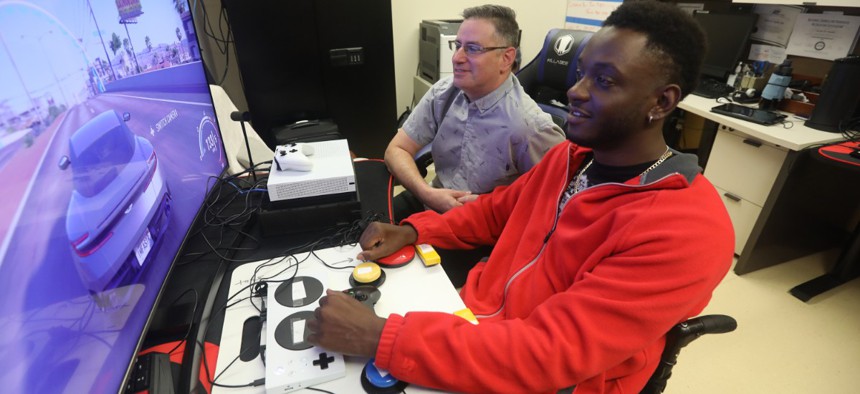Adaptive Gaming Offers Disabled Veterans a New Way To Connect

Mike Monthervil, U.S. Army veteran (front), and Jamie Kaplan, recreation therapist at James A. Haley Veterans’ Hospital in Tampa, Fla., play a video game using an Xbox Adaptive Controller. Jeff Young Photography/Microsoft
A partnership between the Veterans Affairs Department and Microsoft is opening video games and esports up to vets with limited mobility.
The Veterans Affairs Department is collaborating with Microsoft to ignite more inclusivity, connectivity and engagement for veterans with severe disabilities and life-altering injuries. Together, they’ll offer vets with limited mobility unprecedented access to adaptive esports on a national level for the first time in VA’s history.
The tech giant announced it will donate up to 170 Xbox Adaptive Controllers—a new customizable device specifically designed for gamers with disabilities—and other gaming equipment to 22 VA medical centers across the United States, specially picked because they use some form of gaming for vet rehabilitation.
The devices and other equipment will also be available for veterans at events hosted by VA’s Office of National Veterans Sports Programs and the National Veterans Wheelchair Games. Officials hope to eventually integrate adaptive esports into national competitions.
“When someone has a complex disability, these individuals are at higher risk for isolation and higher risk to be withdrawn,” Dr. Leif Nelson, director of the National Veterans Sports Programs and Special Events, said. “So if we are able to provide new pathways, whether it be to communicate, or interact, or engage in a meaningful activity, we’re doing a benefit to the veterans that we serve.”
The adaptive controllers have different control mechanisms and a variety of switches and buttons that can make Xbox and PC gaming far more accessible to a number of players. Medical professionals at the VA will use the devices for rehabilitative and recreational activities to encourage community building and challenge muscle activation and hand-eye coordination for people with spinal cord injuries, amputations and neurological or other injuries.
“This is allowing us to not just connect with vets we maybe weren’t reaching before, but it’s also providing vets already in our system new tools to be active,” Nelson said.
James Kaplan, a recreation therapist at James A. Haley Veterans’ Hospital in Tampa, has used gaming for therapy with his patients—about 25 percent of whom have had traumatic spinal injuries—for almost a decade. Certified in assistive technology, Kaplan has tried out a variety of different gaming equipment and used a 3D printer to make some on his own.
“This is the first time a mainstream gaming company that is pretty much familiar worldwide has come out and said ‘there’s a whole population that we are not meeting the needs of,’” Kaplan said. “And so they’ve stepped up to partner with us to meet those needs.”
Kaplan witnessed how making gaming more accessible and inclusive can transform the lives of veterans and their families.
“I’ve had a number of patients who were deployed overseas in Iraq and Afghanistan who had their families send their gaming consoles over, and when they had down time or they weren’t out on patrol or not on active duty, they were gaming,” he said. And experiencing traumatic injuries does not extinguish their love of video games.
“Literally this happens to me at least once a week, or once every other week: I’ll have patients tell me, ‘I never thought I'd be able to do this again,’” Kaplan said. “So as a therapist, that reinforces for us that we are doing the right thing.”
Partners for more than 20 years already, Microsoft was in touch with VA prior to the controller’s market release and the company tested the new tech at last year’s National Veterans Wheelchair Games in Orlando. Nelson said vets lined up in excitement to try the controller out.
“A large portion of the veterans that were there did engage with it. Vets that were gaming already were excited to see a technology that was specifically designed to help them,” Nelson said.
Going forward, VA will provide Microsoft with feedback about the Xbox Adaptive Controller in order to inform the company’s future work on adaptive technology. VA also hopes that access to the new devices will inspire veterans to form local gaming communities and the department aims to eventually introduce adaptive esports into national competitions.
A Microsoft spokesperson told Nextgov the idea for the device was sparked at an internal hackathon event through the story of a military veteran who needed something other than the traditional Xbox Wireless Controller. The idea also stemmed from seeing a custom rig built for a veteran by Warfighter Engaged, an organization that improves the lives of severely injured and disabled military personnel with custom adapted gaming controllers and other solutions promoting independence.
“Veterans have been an integral part of the Xbox Adaptive Controller’s story,” the spokesperson said. “Our goal with the controller was to make gaming more accessible and give people around the world more opportunity to play the games they want, with the people they want, on the devices they want.”
And for Kaplan, it’s been most rewarding to see the impacts accessibility to these devices has on vets’ interactions with their loved ones. He said it helps injured vets return to normalcy in their families by reintroducing an outlet they can enjoy with their kids.
“For them to start to achieve things that they once saw as a dead-end fulfills me on a daily basis,” Kaplan said.






